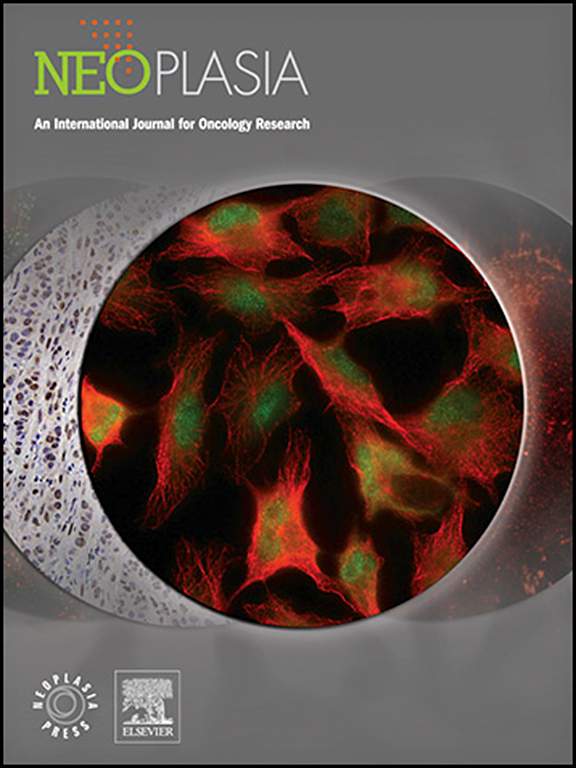髓母细胞瘤细胞在组织环境中的生长和扩增需要极光激酶 B。
IF 4.8
2区 医学
Q1 Biochemistry, Genetics and Molecular Biology
引用次数: 0
摘要
人们对髓母细胞瘤(MB)的组织环境对肿瘤生长和药物反应的影响知之甚少。为了深入了解接受治疗的髓母细胞瘤肿瘤细胞的生长和扩散行为,我们将三维细胞培养筛选与体外有机小脑切片共培养(OCSC)相结合,从而评估了肿瘤细胞在组织环境中的行为。为了确定参与侵袭的可药用激酶通路,我们筛选了274种激酶抑制剂,并确定极光激酶B(AURKB)是MB潜在的抗侵袭药物靶点。我们在小脑切片培养模型中验证了AURKB抑制剂(AURKBi)Barasertib(AZD1152-HQPA)和结构不相关的化合物GSK-1070916对SHH和Grp3 MB的抑瘤活性。重要的是,AURKBi 在组织环境中具有抑制肿瘤的作用,在体外对相同治疗具有抗药性的 MB 肿瘤细胞中也是如此。我们通过 siRNA 基因抑制 AURKB,证实了 AURKB 在组织环境中对肿瘤生长和扩张的要求。我们发现,在高侵袭性 MB 细胞模型 ONS-76 中,AURKBi 与 SRC/BCR-ABL 抑制剂达沙替尼联用可协同抑制肿瘤的生长和扩张,但在 Grp3 MB 细胞中则无效。我们证明,药理抑制 AURKB 可抑制组织中的肿瘤生长,与作为阳性对照的 X 射线照射后观察到的肿瘤生长减少效果相当。最后,我们还发现,暴露于 µM 浓度的巴拉塞替不会对鱼类幼体造成发育毒性。总之,我们证明了 AURKB 对 MB 肿瘤在组织环境中的生长和扩张至关重要,抑制 AURKB 与照射抑制肿瘤细胞生长的效果相同。因此,对于三岁以下的患者,以 AURKB 为药物靶点可能是克服放疗局限性的一种新方法。本文章由计算机程序翻译,如有差异,请以英文原文为准。
Aurora kinase B is required for growth and expansion of medulloblastoma cells in the tissue context
The impact of the tissue context on tumor growth and drug response in medulloblastoma (MB) is poorly understood. To gain insights into the growth and dissemination behavior of the MB tumor cells under treatment, we combined three-dimensional cell culture screening with ex vivo organotypic cerebellum slice co-culture (OCSC), which allowed the assessment of tumor cell behavior in the tissue context.
To identify druggable kinase pathways involved in invasion, we screened a panel of 274 kinase inhibitors and identified aurora kinase B (AURKB) as a potential anti-invasion drug target in MB. We validated tumor suppressive activities of the AURKB inhibitor (AURKBi) Barasertib (AZD1152-HQPA) and the structurally unrelated compound GSK-1070916 in cerebellum slice culture models for SHH, and Grp3 MB. Importantly, AURKBi are tumor suppressive in the tissue context, also in MB tumor cells that are in vitro resistant to the same treatment. We confirmed the requirement of AURKB for tumor growth and expansion in the tissue context through genetic suppression of AURKB by siRNA. We revealed that the combination of AURKBi with the SRC/BCR-ABL inhibitor Dasatinib acts synergistically to repress tumor growth and expansion in the highly invasive MB cell model ONS-76, but not in Grp3 MB cells. We demonstrate that tumor growth in the tissue context is suppressed by pharmacological inhibition of AURKB, comparable to the growth reduction observed after X-ray irradiation, which was used as the positive control. Finally, we show that exposure to µM concentrations of Barasertib does not cause developmental toxicity in fish larvae.
In conclusion, we demonstrate that AURKB is essential for MB tumor growth and expansion in the tissue context and the inhibition of AURKB is equally efficient as irradiation in repressing tumor cell growth. In patients younger than three years, pharmacological targeting of AURKB may thus constitute a novel means to overcome radiotherapy limitations.
求助全文
通过发布文献求助,成功后即可免费获取论文全文。
去求助
来源期刊

Neoplasia
医学-肿瘤学
CiteScore
9.20
自引率
2.10%
发文量
82
审稿时长
26 days
期刊介绍:
Neoplasia publishes the results of novel investigations in all areas of oncology research. The title Neoplasia was chosen to convey the journal’s breadth, which encompasses the traditional disciplines of cancer research as well as emerging fields and interdisciplinary investigations. Neoplasia is interested in studies describing new molecular and genetic findings relating to the neoplastic phenotype and in laboratory and clinical studies demonstrating creative applications of advances in the basic sciences to risk assessment, prognostic indications, detection, diagnosis, and treatment. In addition to regular Research Reports, Neoplasia also publishes Reviews and Meeting Reports. Neoplasia is committed to ensuring a thorough, fair, and rapid review and publication schedule to further its mission of serving both the scientific and clinical communities by disseminating important data and ideas in cancer research.
 求助内容:
求助内容: 应助结果提醒方式:
应助结果提醒方式:


